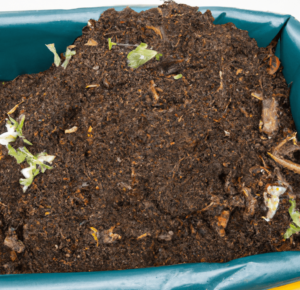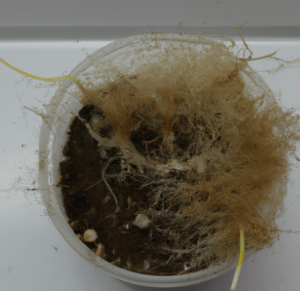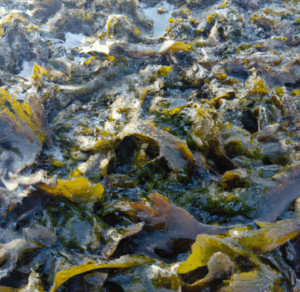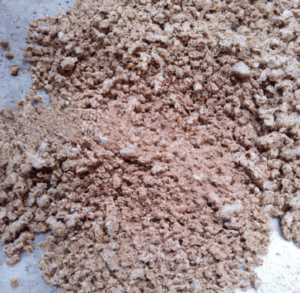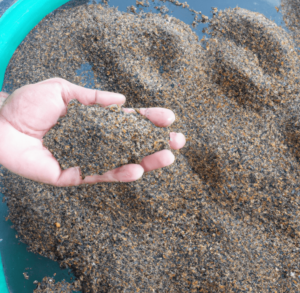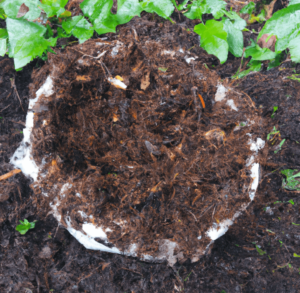Understanding the sorts of plants, the soil, and the best techniques to care for and nurture your garden are crucial when it comes to gardening. The role of mulch in fertilizing your garden is a pretty big one. Here’s our gardening guide to the layer of organic material that’s spread on top of the soil to add nutrients and keep the soil moist.
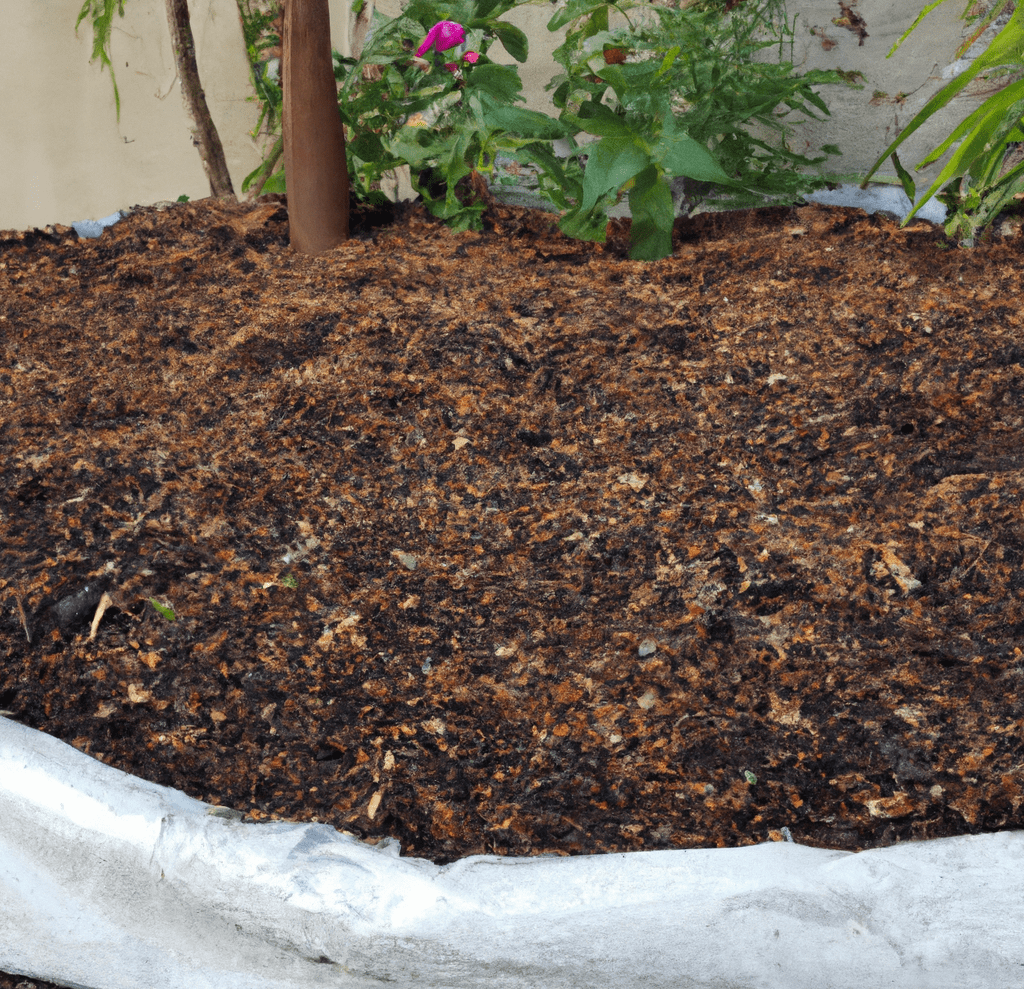
Types of Mulch
To learn more about the role of mulch in fertilizing your garden, you have to get familiar with the different types of mulch first. Mulch comes in a variety of forms, each of which has advantages and disadvantages:
- Organic Mulch: Materials derived from plants, such as leaves, wood chips, straw, or bark, are used to make this kind of mulch. As organic mulch breaks down over time, it aids in enhancing soil fertility and structure. Before laying down organic mulch, it is advised to test the soil to make sure it won’t have a detrimental effect on the soil’s nitrogen levels.
- Inorganic Mulch: This kind of mulch is produced using rubber, gravel, or other non-organic materials. While organic mulch improves soil structure and fertility, inorganic mulch is more durable and does not disintegrate. It works well in locations where preventing soil erosion is a top priority.
- Colored Mulch: Colored mulch is an organic sort of mulch that has been dyed to give your garden a splash of color. It offers no advantages above conventional organic mulch and is best used for ornamental purposes.
When choosing a mulch, it’s crucial to take into account your soil, plants, and gardening objectives because each type of mulch can affect your plants and garden in a different way.
Organic Mulches
When you’re learning more about the role of mulch in fertilizing your garden, you will see a lot of organic mulch on the market. Natural components that are commonly accessible and simple to get, such as wood chips, leaves, straw, and grass clippings, are used to make organic mulches.
The fact that organic mulches supply the soil with vital nutrients as they decompose over time is one of the key advantages of employing them. This gradual release of nutrients aids in soil fertilization and promotes the establishment of healthy plants. Additionally, organic mulches support soil moisture retention, which is crucial for plants that require regular irrigation.
It’s a good idea to have your soil tested to identify any nutrient deficiencies before adding organic mulch to your garden. Given that different mulches contain various amounts of nutrients, you need to better understand and learn how to use fertilizer for different types of plants:
- Wood chips, leaves, straws, and grass clippings are all excellent possibilities for organic mulch.
- Another excellent choice is leaves, which are packed with nutrients and decompose quickly to give the soil a quick boost of minerals.
- Grass clippings and straws are also suitable options because they are accessible and simple to use.
Most people choose organic alternatives after learning about the role of mulch in fertilizing your garden.
Inorganic Mulches
As you learn more about the role of mulch in fertilizing your garden, you may consider inorganic mulch:
- Rubber Mulch: Made from used tires, rubber mulch is a popular option because of its toughness and little upkeep needs. It assists in retaining moisture and controlling soil temperature and is frequently utilized as a safer substitute for conventional playground surfacing. It might not be as aesthetically pleasing as other mulch options and can get heated in direct sunlight.
- Stone Mulch: Stone mulch gives your yard a decorative touch by being formed from tiny stones or pebbles. It aids in moisture retention and erosion prevention, but unlike organic mulches, it does not control soil temperature or enhance the structure or fertility of the soil.
- Plastic Mulch: Made from plastic film, plastic mulch is a kind of inorganic mulch. It is frequently applied in industrial agriculture to manage weeds, holds onto moisture, and maintain soil temperature. It can be challenging to remove if no longer wanted and is not commonly utilized in household gardens.
When selecting an inorganic mulch, it’s crucial to take your unique gardening objectives and the requirements of your plants into account. No matter whatever kind of inorganic mulch you select, keep in mind that it won’t gradually improve soil fertility or add organic matter like organic mulches like leaves.
How Mulch Fertilizes the Garden
So, what is the role of mulch in fertilizing your garden? Let’s examine mulch’s role in garden fertilization in more detail. It’s crucial to first realize that the soil in your garden is continually undergoing change.
- Plants absorb nutrients, and over time, the soil may lose its supply of these vital components. By adding mulch to the garden, you are replacing the soil’s depleted nutrients and preserving its fertility.
- Understanding the precise requirements of your garden requires conducting soil testing. You may select the best kind of mulch to utilize by being aware of the nutrients that are deficient in your soil. If your soil is deficient in nitrogen, for instance, you can decide to use a mulch rich in nitrogen, like grass clippings.
- The beginning of the growing season in the spring is an excellent time to put a brand-new layer of mulch in your garden. This will give your plants the nutrients they need to thrive while also regulating soil temperature and moisture retention. These nutrients will be released into the soil when the mulch decomposes over time, where they will be absorbed by the roots of your plants.
Improving Soil Structure
When diving into the role of mulch in fertilizing your garden, you may want to learn how to create your own compost and use it as fertilizer or use the following to improve soil structure:
- Mulch: By adding a layer of mulch to your garden, you can eventually improve the structure of the soil as the mulch breaks down. For this purpose, organic mulches like wood chips or leaves work excellent.
- Fertilize: By incorporating vital nutrients into the soil, regular fertilization can assist increase soil fertility and structure. Choose a fertilizer that is suitable for the kind of plants you are growing and apply it according to the manufacturer’s directions.
- Water: For a healthy soil structure, proper irrigation is essential. Avoid overwatering, which can compress the soil and make it hard for roots to establish themselves. Water deeply and sparingly, letting the soil somewhat dry up in between applications.
- Aerate: By breaking up compacted soil and facilitating easier penetration of air, water, and nutrients, regular soil aeration can assist improve soil structure. You can aerate your soil by walking on it and breaking up any compacted areas, using an aerator or a garden fork, or both.
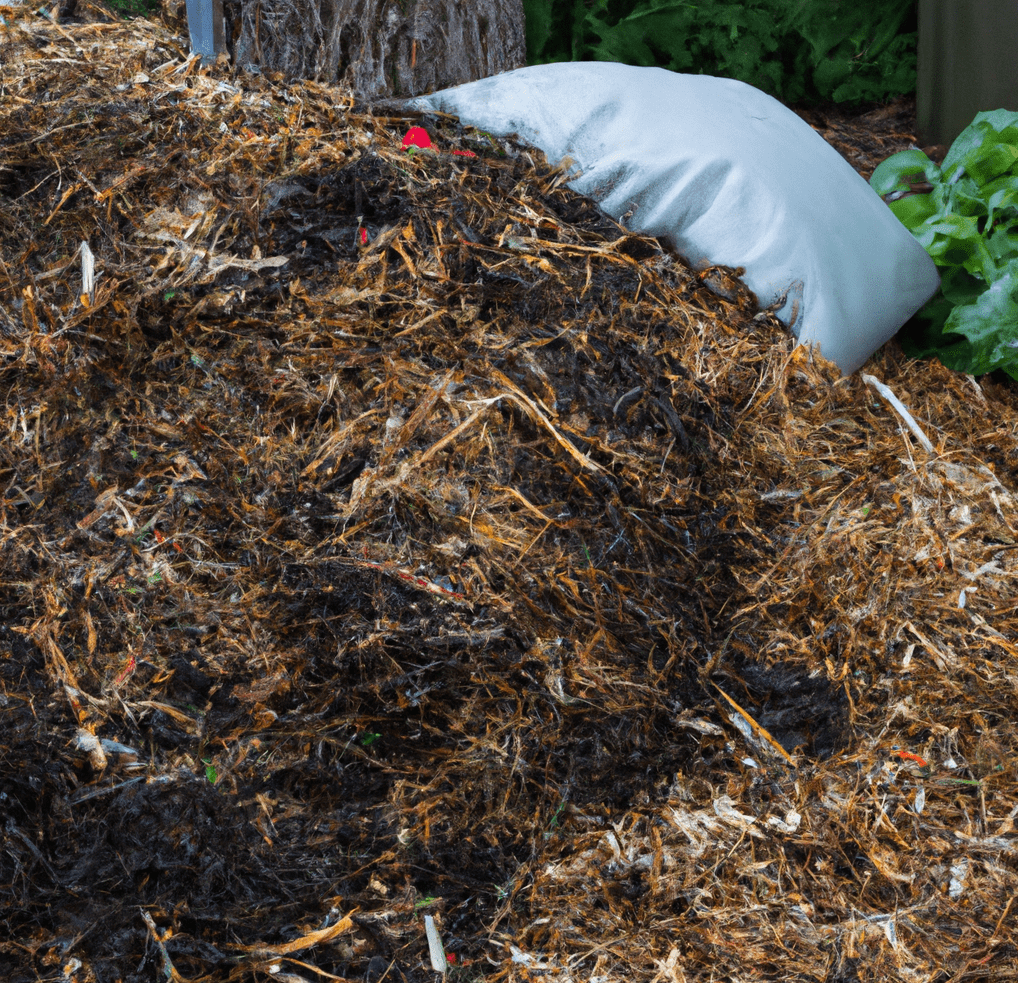
You can make sure that your garden has healthy, well-structured soil, which is necessary for producing healthy, thriving plants this way.
Retaining Moisture in the Soil
In addition to being one of the many fertilizers available, mulch is essential for maintaining the soil’s moisture content, which is vital for the health of your plants.
You can guarantee that your plants have adequate water to develop and thrive by keeping moisture in the soil. Mulch functions as a blanket on top of the soil in your garden, helping to reduce the rate at which water evaporates. This is crucial during the hot summer months when the soil can quickly dry out.
You can save time and money by reducing the amount of water your plants need by keeping moisture in the soil. Mulch aids in controlling soil temperature in addition to preserving moisture. Mulch can help protect the roots of plants from extreme heat or cold because plants are sensitive to temperature changes.
Another essential component of mulch is organic matter, and when the mulch decomposes over time, it will enrich the soil with organic matter. By enhancing the soil’s structure, this organic matter makes it simpler for water to permeate and for roots to grow.
Mulch is necessary for maintaining moisture in the soil, in addition to being essential for fertilizing your plants. You can build a flourishing garden that is full of strong plants and vivid colors by selecting the appropriate type of mulch for your soil and applying it properly after the role of mulch in fertilizing your garden.
Suppressing Weed Growth
It’s critical to keep weeds under control in your garden since they might compete with your plants for resources like water, nutrients, and sunlight. As you learn about the role of mulch in fertilizing your garden, you can keep the following tips in mind:
- A soil test will help you figure out the pH and nutrient content of your soil, which can then help you figure out what kinds of plants are most suited for your garden. You can lessen weed development by selecting plants that are compatible with your soil.
- By blocking light from reaching weed seeds and slowing their germination, adding a layer of mulch to your garden can help control weed growth. Pick an organic mulch, like wood chips or leaves, which will gradually strengthen the structure of the soil.
- Choosing plants with dense, luxuriant foliage helps reduce the growth of weeds by shading the soil and preventing the germination of weed seeds.
- Nitrogen is an essential ingredient for plant development, however, too much nitrogen can promote the growth of weeds. Use a fertilizer that is suitable for the plants you are cultivating in your garden and fertilize it according to the manufacturer’s application directions.
You can prevent weed development in your garden and make sure your plants have the resources they need to thrive by paying attention to these suggestions.
Regulating Soil Temperature
Soil temperature regulation is another role of mulch in fertilizing your garden. Depending on the weather, the soil’s temperature can vary significantly, which can be bad for your plants. Mulch serves as a shield on top of the soil, protecting it from high temperatures. Extreme weather circumstances, such as hot summer days or chilly winter nights, can make this especially crucial.
Understanding the particular requirements of your garden through soil testing is also crucial because it can guide you in selecting the best kind of mulch for your soil. For instance, you might decide to use a lighter-colored mulch if your soil is prone to warming because it will reflect the sun’s rays and keep the soil cooler. The health of your plants depends on the temperature of the soil, which is something that mulch greatly influences.
Enhancing Soil Fertility
Now that you know more about the role of much in fertilizing your garden, you can enhance the fertility of your soil:
- Mulch: Adding organic mulch to your garden, such as wood chips or leaves, will boost the soil’s fertility over time as it breaks down. The mulch’s organic content will improve the soil and give your plants the vital nutrients they need.
- Leaves: Gathering and composting fallen leaves can be an excellent approach to improve soil fertility by adding organic matter. Simply arrange the leaves in a garden corner, give them a little water here and there, and wait for them to rot.
- Plants: By fixing nitrogen in the soil, some plants, like legumes, can increase soil fertility. To help balance your soil fertility, think about combining nitrogen-fixing plants with other plants that have various nutrient needs.
- Water: For the soil to remain fertile and healthy, proper irrigation is necessary. Make sure to water your garden deeply and sparingly, letting the soil get a little bit dry in between applications. Overwatering can cause soil compaction and hinder roots’ ability to saturate the soil.
How to Apply Mulch in the Garden
Now that we all know that the role of much in fertilizing your garden is important, you can apply mulch by following these steps:
- It’s critical to select the best kind of mulch for your soil and plants. You may choose the type of mulch that will work best for your garden by conducting a soil test.
- Before applying mulch, it is vital to prepare the soil by getting rid of any weeds or dead plant debris. This will aid in limiting the spread of undesirable plants in your garden.
- For mulch to be successful at controlling soil temperature and moisture retention, it should be placed at a depth of 2-3 inches.
- Mulch in your yard needs to be maintained regularly since it can degrade over time. To guarantee that their garden continues to benefit from mulch, gardeners should add new mulch each spring.
Bottom Line: The Role of Mulch in Fertilizing Your Garden
The role of mulch in fertilizing your garden is an essential one. as it aids in the retention of moisture in the soil, decreasing the frequency of irrigation. Mulch can also slow the growth of weeds, which can reduce the time and effort required for weed control. Finally, mulch can strengthen the soil’s overall structure, making it more fertile and able to support your plants which is why we recommend it.
FAQs on The Role of Mulch in Fertilizing Your Garden
What function does mulch serve in garden fertilization?
A layer of organic material called mulch is applied on top of the soil to help it retain moisture and add nutrients. You may replenish the soil’s depleted nutrients and maintain its fertility by spreading mulch to the garden. Over time, organic mulch breaks down, releasing nutrients into the soil that improve soil fertility and structure and are absorbed by plants.
What varieties of mulch are there?
There are many types of mulch, including colored mulch, inorganic mulch, and organic mulch. Organic mulch is created using plant-based materials like leaves, wood chips, straw, or bark. Non-organic materials, such as rubber, gravel, or stone, are used to make inorganic mulch. Organic mulch that has been colored for decorative purposes is referred to as colored mulch.
How do organic mulches work?
Organic mulches are vital for enriching the soil and fostering healthy plant growth because they are created from organic materials like wood chips, leaves, straw, and grass clippings. Organic mulch increases soil structure, fertility, and moisture retention as it breaks down over time. It also releases essential nutrients into the soil.
Inorganic mulches: what are they?
The materials used to create inorganic mulches, such as rubber, stone, or plastic, are not organic. However, unlike organic mulches, they do not enhance soil structure, increase soil fertility, or provide organic matter. Instead, they conserve moisture and regulate soil temperature. It’s crucial to take into account both the needs of your plants and your particular gardening objectives when selecting an inorganic mulch.
How does mulch nutrient the soil in the garden?
You may replenish the soil’s depleted nutrients and maintain its fertility by spreading mulch to the garden. The mulch decomposes, releasing nutrients into the soil that are then taken up by the plants. By analyzing the soil’s nutrient deficiencies, soil testing can assist select the appropriate kind of mulch to utilize. To give your plants the nutrients they require to thrive, spring is the best time to add a fresh layer of mulch.


